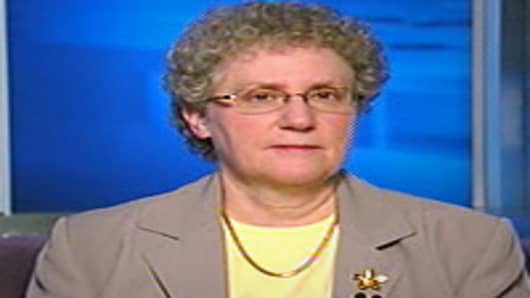The recent economic troubles that caused Goldman Sachs to slash its growth outlook are only temporary and unlikely to stand in the way of stock market rally, the firm's senior investment strategist said.
In keeping with a long history of bullish forecasts, Abby Joseph Cohen told CNBC that even though her firm cut its quarterly gross domestic forecast last week from 3 percent to 2 percent, that doesn't reflect broader pessimism about where the economy and markets are heading.
"We believe that 2 percent GDP number for the quarter is something that represents special factors in the quarter and we do think economic growth will be reaccelerating toward the end of the year," Cohen said in a live interview.
The "underlying growth rate" for the economy will be closer to 3 percent for the remainder of the year, she said, a level that would support Goldman's prediction that the Standard & Poor's 500 will close out 2011 in the 1450 range, which would represent a 12 percent gain from current levels.
Cohen spoke as the market awaited the latest proclamation from the Federal ReserveOpen Market Committee and the central bank's chairman, Ben Bernanke.
Even as the economy has softened, with 9.1 percent unemployment and a double-dip in housing prices, the Fed said Wednesday it is not changing course from the expected end of quantitative easing at the end of June.
Pimco's Bill Gross did say on Twitter that he expects Bernanke to hint at some form of additional easing at the next Jackson Hole, Wyo., summit in August. But Cohen said she is part of the consensus that expects the Fed to stand pat.
"The confidence that most investors are showing in the Federal Reserve is well founded," Cohen said. "This is the Fed that took aggressive action when it needed to and our sense is they are coasting into a neutral zone."
One reason for her optimism, she said, is that regional banks are starting to lend again.
"Up until about six months ago they kept tightening and tightening credit standards and they were not increasing the amount of lending," Cohen said. "They are becoming a little bit easier. There is more lending going on."



